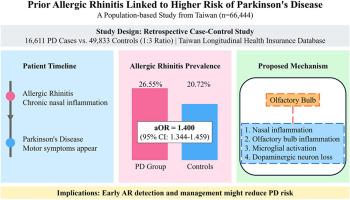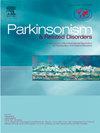既往过敏性鼻炎与帕金森病的关系
IF 3.4
3区 医学
Q2 CLINICAL NEUROLOGY
引用次数: 0
摘要
越来越多的证据表明慢性炎症可能是帕金森病(PD)发病的关键因素。本研究旨在利用台湾健康保险理赔资料库,探讨是否有变应性鼻炎(AR)病史与PD风险升高有关。方法从2010年台湾健康保险纵向数据库中检索病例对照研究数据。本研究纳入16611例年龄≥50岁首次诊断为PD的患者和49833例倾向评分匹配对照。为了评估既往AR和PD之间的关系,采用多变量logistic回归模型计算校正优势比(ORs)和95%置信区间(ci)。结果在未经调整的分析中,我们发现既往AR在PD患者中的发生率明显高于对照组(26.55%比20.72%,OR = 1.38, 95% CI: 1.33-1.44, p < 0.001)。在调整了年龄、性别、月收入、地理区域、城市化水平、高血压、糖尿病、高脂血症、听力损失和冠心病等因素后,多变量模型中,这种相关性在统计学上仍然显著,且程度相似(OR = 1.40; 95% CI: 1.34-1.46, p < 0.001)。这一基于人群的分析提供了支持AR与PD风险增加之间存在实质性关联的证据。这些结果表明,AR不仅应该被认为是一种广泛流行的炎症性疾病,而且应该被认为是神经退行性病理生理的潜在贡献者。本文章由计算机程序翻译,如有差异,请以英文原文为准。

Association between prior allergic rhinitis and Parkinson's disease
Introduction
A growing body of evidence suggests that chronic inflammation may be a key contributor to Parkinson's disease (PD) pathogenesis. This study aimed to investigate whether a prior history of allergic rhinitis (AR) is associated with an elevated risk of developing PD by utilizing Taiwan's nationwide health insurance claims database.
Methods
We retrieved data for this case-control study from the Taiwan Longitudinal Health Insurance Database 2010. This study included 16,611 individuals aged ≥50 years old who received a first-time diagnosis of PD as cases and 49,833 propensity-score-matching controls. To evaluate the association between prior AR and PD, multivariable logistic regression models were employed to calculate adjusted odds ratios (ORs) along with 95 % confidence intervals (CIs).
Results
In unadjusted analysis, we found that prior AR was significantly more prevalent among patients with PD than among controls (26.55 % vs. 20.72 %, OR = 1.38, 95 % CI: 1.33–1.44, p < 0.001). This association remained statistically significant and similar in magnitude in the multivariable model after adjustment for age, sex, monthly income, geographic region, level of urbanization, hypertension, diabetes, hyperlipidemia, hearing loss, and coronary heart disease (OR = 1.40; 95 % CI: 1.34–1.46, p < 0.001).
Discussions
This population-based analysis provides evidence supporting a substantive association between AR and an increased risk of PD. These results suggest that AR should be recognized not only as a widely prevalent inflammatory disorder but also as a potential contributor to neurodegenerative pathophysiology.
求助全文
通过发布文献求助,成功后即可免费获取论文全文。
去求助
来源期刊

Parkinsonism & related disorders
医学-临床神经学
CiteScore
6.20
自引率
4.90%
发文量
292
审稿时长
39 days
期刊介绍:
Parkinsonism & Related Disorders publishes the results of basic and clinical research contributing to the understanding, diagnosis and treatment of all neurodegenerative syndromes in which Parkinsonism, Essential Tremor or related movement disorders may be a feature. Regular features will include: Review Articles, Point of View articles, Full-length Articles, Short Communications, Case Reports and Letter to the Editor.
 求助内容:
求助内容: 应助结果提醒方式:
应助结果提醒方式:


